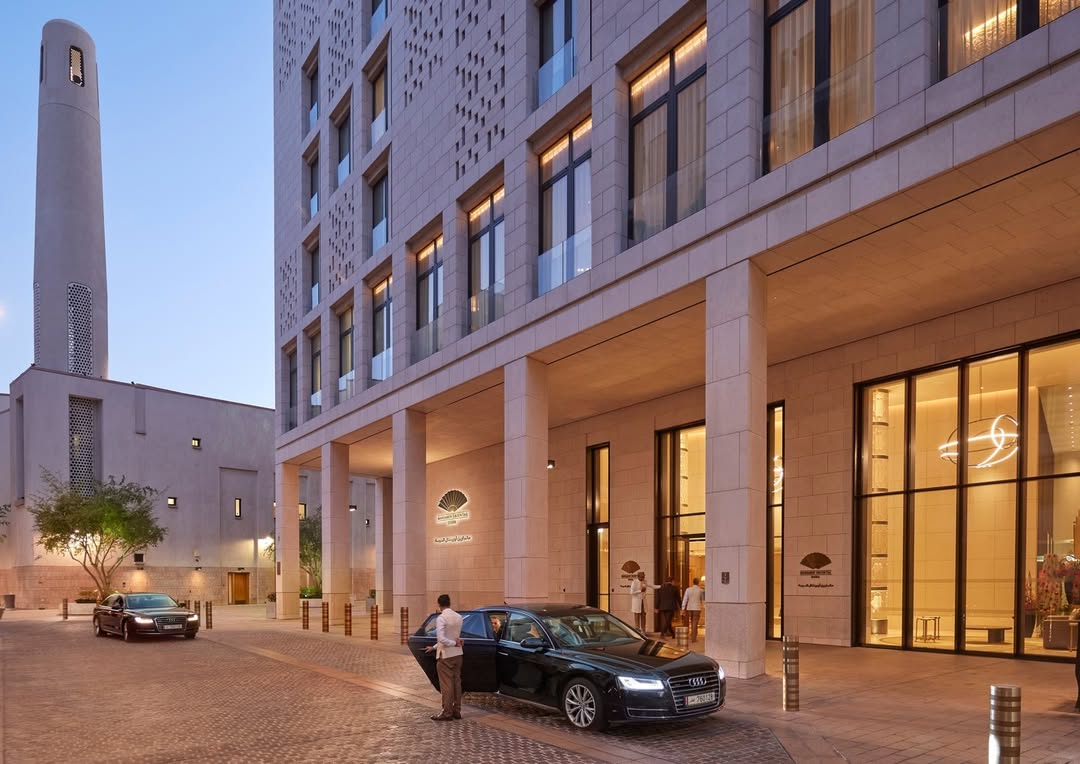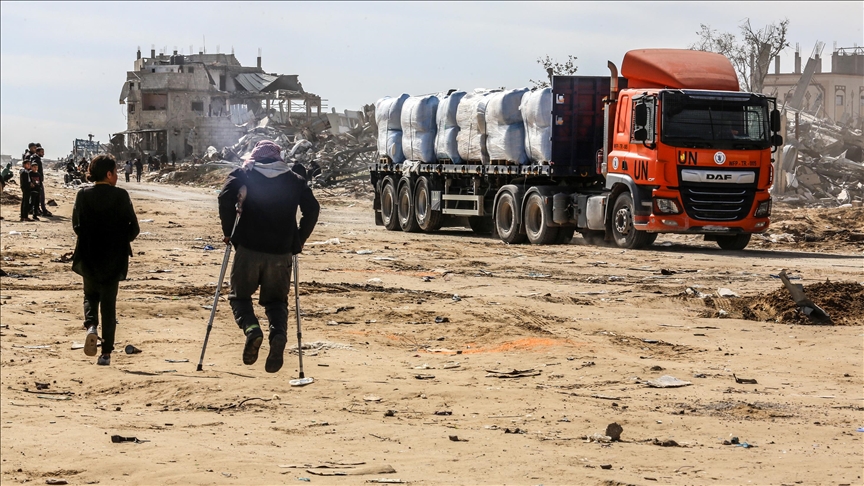Amir Tamim delivered an impassioned speech at UNGA.
Qatar’s Amir Sheikh Tamim bin Hamad Al Thani delivered yet another powerful address at the 78th United Nations General Assembly (UNGA) in New York on Tuesday.
During his speech, his eleventh since becoming the leader of the nation in 2013, the Qatari amir highlighted key issues concerning the Middle East region and beyond while taking special aim at the wave of Islamophobic incidents involving the desecration of the Holy Quran in Europe.
The Qatari leader also addressed the Islamophobic trend of Quran desecrations that has plagued Europe.
Since the start of the year, far-right leaders in Europe – Denmark, the Netherlands and Sweden – have launched provocative Quran burning stunts that have triggered global outrage and drew condemnation from Muslim countries, including Qatar.
“Allow me to pinpoint the necessity for combating racism and campaigns of incitement against entire peoples, religions, and civilisations,” Sheikh Tamim said.
The stances of certain European governments in allowing and enabling the repetition of such incidents based on legal arguments surrounding freedom of speech and individual rights has prompted many to point out the double standard approach to state condemnation of religious hate crimes.
Doha has long adopted an unwavering stance in the face of Islamophobia globally, being one of the few to stand with utmost intolerance towards anti-religious hate crimes.
“On this occasion, I would say to my Muslim brethren that it is implausible for us to get distracted by an idiot or a biased person whenever it occurs to him to provoke us by burning the Holy Qur’an or by other forms of triviality.”
“The Qur’an is too Holy to be desecrated by a witless person. God Almighty said: ‘Embrace forgiveness and enjoin what is right and turn away from the ignorant.’ At the same time, I would say to all those who seek to justify these hideous acts as freedom of expression: compromising the sanctity of others deliberately should not be seen as an example of the freedom of expression.”
The powerful speech raised a number of other issues, firstly launching with recent tragedies in North Africa.
Morocco and Libya
The amir launched his speech talking points stood Morocco, where a 6.8 magnitude earthquake on 8 September claimed the lives of over 2,800 and left numerous others unaccounted for.
“Allow me first of all to offer my sincere condolences to His Majesty King Mohammed VI and to the brotherly Moroccan people for the victims of the devastating earthquake,” the Qatari leader said.
At the same time, Sheikh Tamim addressed Libya, where 3,958 have been killed by a deadly flood, according to a revised UN death toll report. The revised report also states that more than 9,000 people are still missing.
“I also extend my condolences to the government and people of the brotherly state of Libya for the victims of the floods there,” he said.
“We affirm our solidarity with the Moroccan and Libyan people regarding the victims of the earthquake and floods.”
Technology and AI
The amir acknowledged the blessings of living in an era of remarkable progress driven by innovation in medicine, technology, and science. He emphasised that humanity’s ability to harness resources for a better life has multiplied, creating a world where science fiction visions are becoming reality.
However, while this progress has raised life expectancy and living standards, it has come at a cost. Sheikh Tamim pointed out that poverty, unemployment, wealth inequality, and environmental concerns have spiked.
“As these possibilities are unfolding in the same era, there are people who are grappling with child labour, starvation, unemployment, and civil wars, while developed countries guard their borders against the influx of refugees fleeing this suffering, as if the peoples on earth are living in two different eras,” he said.
Sheikh Tamim underlined the importance of science and technology in improving human life quality and productivity. However, he cautioned against celebrating advancements without considering their ethical implications, citing historical disasters like nuclear weapons, human experimentation, and genocide.
“Undoubtedly, science and technology are crucial for increasing productivity and improving human life quality. But celebrating the means without responsible thinking about the ends for which they are used has led to major disasters such as using nuclear weapons, conducting dangerous experiments on humans, and the genocide in concentration camps.”
“It is incumbent on us to keep pace with the scientific and technical development and encourage it in our countries, and that barriers between countries in this field must be removed,” he added.
Amidst these challenges, Amir Tamim announced that the Web Summit 2024 would take place in Doha. This event, he noted, “constitutes an important opportunity to review development in the field of technology, and create new cooperation opportunities in the realm of technology for the benefit of all humanity.”
The leader then proceeded to welcome everyone to this occasion in Doha, unfolding next year from 26 to 29 February.
Palestine
Given Doha’s continued commitment to the Palestinian issue as a fundamental aspect of its foreign policy, Amir Tamim devoted a portion of his speech to draw attention to the importance of enforcing global resolutions and exerting pressure on Israel to cease its illegal occupation.
In a powerful statement, the Qatari leader addressed the international community with a message: “If we truthfully constitute an international community, and not a merely diverse entities, it must be our duty to strive towards ending the injustice afflicting them, at least in accordance with what is required by the resolutions of this body, and entailed by international law.”
“It is not acceptable for the Palestinian people to remain prisoners of the Israeli settler occupation arbitrariness, and the rejection of any just political solution in accordance with the principles of international legitimacy by successive Israeli governments,”
“You have to bear in mind that the failure of the international organisation to take actions against the occupation provided and continues to provide the opportunity for Israel to undermine the foundations of the two-state solution by means of settlement expansion until the occupation has brazenly taken the form of an apartheid regime in the broad daylight of the twenty-first century,” Sheikh Tamim asserted in a UN event attended by world leaders.
“Even some of Israel’s close friends have taken notice of this,” he said, just months after the United Arab Emirates strongly condemned Israeli attacks on the Palestinian city of Jenin and its camp in June through airstrikes and shootings.
“Israel also responds to Arab peace and normalisation initiatives with more nationalist and ultra-orthodox intransigence and extremism that is reflected in government coalitions and further settlement expansion, in addition to the Judaisation of Jerusalem, attacks on holy sites,” Sheikh Tamim said.
MENA political affairs
Amir Tamim emphasised the ongoing Syrian crisis, which remains unresolved, with the Bashar Al Assad regime placing an iron grip onto its authority.
“It is not permissible to condone the gross injustice that has befallen the brotherly Syrian people as if it is its destiny. The crisis is still awaiting a comprehensive settlement through a political process leading to a political transition, in accordance with the Geneva Declaration-1 and the Security Council Resolution 2254, in a way that meets the Syrian people’s aspirations while maintaining Syria’s integrity, sovereignty and independence.”
Also in his speech, Sudan, currently grappling with an ongoing conflict between internal actors, was addressed.
“It is regrettable to witness the outbreak of violence in Sudan this year, which has left a dire impact on the brotherly Sudanese people and exacerbated refugee crisis,” Sheikh Tamim said.
“We condemn the crimes perpetrated against civilians in the capital Khartoum and the Darfur region, and we call for holding perpetrators to account. We also call for cessation of fighting, resort to the voice of reason, and spare civilians the consequences of fighting.”
In his address at the UNGA, Qatar’s Amir emphasised the importance of international solidarity and humanitarian assistance, particularly in addressing the ongoing crisis in Lebanon.
“In brotherly Lebanon, where danger hangs over the state’s institutions, we stress the need for finding a sustainable solution to the political vacuum, introducing mechanisms that thwart its recurrence, and forming a government capable of addressing the aspirations of the Lebanese people and getting them out of their economic and developmental crises,” the leader noted.
“The prolonged suffering of this brotherly people, caused by political and personal calculations, is regrettable.”
As for Yemen, the amir stressed the necessity to uphold international resolutions in tackling the crisis. “Yemen, we call for the crisis to be resolved in accordance with the resolutions of the National Dialogue, the Gulf Initiative, and the relevant Security Council resolutions,” noted Sheikh Tamim.
Libya was also pinpointed in the speech at UNGA.
“Concerning the Libyan issue, we reiterate our unwavering support for the efforts of the Special Representative of the Secretary-General, Head of the United Nations Support Mission in Libya, and his efforts to achieve tangible results to resolve Libyan crisis,” Amir Tamim said before the assembly.
Deducing the ultimate message his country’s believes is the solution in tackling the aforementioned Middle East and North African political affairs, Sheikh Tamim said: “It is clear that the solution in all sisterly countries that I have mentioned lies in reaching consensus on state’s entity and citizenship.”
The amir also addressed the recent regional rapprochement moves, which witnessed Iran and Saudi Arabia to re-establish diplomatic ties, marking the end of a seven-year rift. Egypt and Turkey also appointed ambassadors in July to restore their relations at the highest diplomatic level.
“In the context of talking about our region, we reiterate our appreciation of the détente witnessed this year, as represented by constructive dialogue and re-establishment of ties between the sisterly countries, the Kingdom of Saudi Arabia and the Islamic Republic of Iran, as well as between the Arab Republic of Egypt and the Republic of Türkiye,” Sheikh Tamim said.
Afghanistan
Amid global concerns regarding Afghanistan’s future, the Amir reaffirmed Qatar’s commitment to coordinating international efforts.
“We continue to coordinate international efforts and facilitate dialogue between the United Nations, the countries concerned, and the caretaker government of Afghanistan to ensure compliance with the Doha Agreement, in a way that ensures non-recurrence of past mistakes”
In February 2020, under the former Donald Trump administration, the United States and the Taliban signed the Doha Agreement in Qatar that set 1 May 2021 as the deadline for the complete withdrawal of foreign forces from Afghanistan.
However, the pull out was on the condition that the Taliban halts its support for terrorist organisations.
Europe
Against the backdrop of a war in Europe that has engulfed not only Russia and Ukraine but the entire continent, and reverberated worldwide in crucial sectors like energy and food, Qatar’s amir addressed the pressing need for change.
“In the absence of a prospect for a permanent political solution, and due to the ability to keep the war raging indefinitely by major international blocs engaging directly or indirectly in the war, a long-term truce has become the most looked for aspiration by people in Europe and all over the world,” he said
“However, this cannot be the basis for long-term stability.”
“Based on the harm that befallen the peoples of the two countries and the peoples of the world, and because this status quo cannot be accepted, we reiterate our call on all parties to comply with the United Nations Charter and the international law, respect the sovereignty and territorial integrity of states, and resort to a radical peaceful solution that is based on these principles.”
Qatar
Reflecting on the 2022 World Cup held in Qatar, the amir noted the opportunity it provided for global interaction. He highlighted how the event showcased aspects of Qatari culture and values, emphasising Doha’s role as a global hub bridging East and West.
He stressed the pivotal role of sports in fostering communication and cultural understanding between diverse peoples. The amir expressed hope that the tournament had contributed to dispelling stereotypes while presenting an innovative and secure sporting experience to the world.
“I hope that we have contributed, through this tournament, to breaking the stereotypes, and presented a new exciting and safe tournaments’ formula to the world,” Sheikh Tamim expressed.
The Qatari amir also underscored Doha’s hopes of becoming a prosperous nation, a vision built upon decades of meticulous planning and comprehensive development efforts. He acknowledged significant achievements, particularly in liquefied gas investments, which not only bolstered the Gulf nation’s prosperity but also addressed global energy challenges.
“While investing in liquefied gas was a leverage to realize this dream, this investment has enabled us to play an important role in addressing the energy challenge around the world with a realistic vision that takes into account the world needs for a diverse mix of different energy sources by using the highest levels of advanced technology which is, at the same time, environmentally friendly,” the leader said.
“We realise that energy export imposes obligations on us, as a reliable partner, towards the world countries, while at the same time, imposes obligations on us towards our people and the future generations as well.”
In line with this commitment, Qatar is actively diversifying income sources and investing in clean energy, aligning with environmentally-friendly policies. The amir announced Qatar’s upcoming hosting of the Qatar Horticultural Expo next month.
“The responsibility also prompts the State to strengthen its role in providing humanitarian aid, exerting mediation efforts and resolving conflicts that affect our region.”
“The path to resolve conflicts through peaceful means is a long and strenuous path, but it is less costly than wars, and our commitment to continue our efforts in facilitating and making peace is a firm commitment deeply rooted in the core of our foreign policy,” the Qatari leader added.
Affirming Qatar’s deep partnership with the United Nations, Sheikh Tamim highlighted the opening of the United Nations House last year in Doha. This complex houses twelve UN offices and was inaugurated in the presence of the UN Secretary-General.
The amir raised Qatar’s significant role in hosting the Fifth United Nations Conference on the Least Developed Countries earlier this year, a high-profile international forum.
“It galvanised efforts to achieve the ambitious goals of the Doha Action Program for the benefit of the least developed countries for the decade 2022-2031. While we affirm that the State of Qatar is a major and active partner in the endeavours to respond to the priorities and needs of these countries, we welcome the Sustainable Development Goals Summit held yesterday,” the amir noted.
Qatar is working alongside Ireland to facilitate government negotiations on the political declaration adopted during the summit.
“We are pleased that the State of Qatar is once again playing a leading role in major debates under the umbrella of the United Nations, the most recent of which is working with Ireland to facilitate government negotiations on the political declaration adopted by the Sustainable Development Goals Summit yesterday.”
“We believe that cooperation in these areas contributes to stem the waves of refugees, which have become a real problem for Europe as well as for African and Asian countries.”







